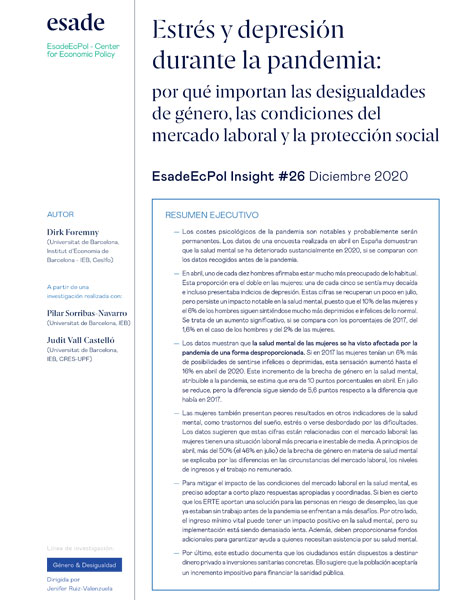
insight Gender & inequality
Stress and depression during the pandemic: Why gender inequalities, labour market conditions, and a reliable transfer system matter
Dirk Foremny
22 Dec, 2020
EsadeEcPol | Policy Insight
This document is part of the Gender and Inequality research line, led by Jenifer Ruiz-Valenzuela
Executive summary
- The psychological costs of the pandemic are vast and likely to be permanent. Representative survey data collected in April and July 2020 in Spain shows that mental health has deteriorated substantially in 2020 compared to data collected before the pandemic.
- One out of ten men reported to be much more worried than usual in April 2020. This figure was double for women: one out of five women was affected by severe unhappiness or even signs of depression. These numbers improved slightly in July, but the persistency of the mental health impact is remarkable as 10% of women and 6% of men continued to feel much more depressed or unhappy than usual. This is a large increase compared to 1.6% of men and 2% of women in 2017.
- The data show that women’s mental health has been disproportionally affected by the pandemic. Whereas woman were 6 percentage points more likely to feel unhappy or depressed in 2017, the difference increased to 16 percentage points in April 2020. The widening of the gender gap in mental health attributable to the pandemic itself was estimated as high as 10 percentage points in April. This gap decreased in July but remained large, with a 5.6-percentage-point difference between genders relative to the pre-existing difference in 2017.
- Other measures of mental health such as sleeping disorders, being constantly tense, and unable to overcome difficulties showed similar results. Women reported worse feelings in all questions, with substantially larger differences during the pandemic. Women faced greater probabilities of suffering mental health problems because of more precarious and unstable labour market situations. At the beginning of April, more than 50% (46% in July) of the mental health gender gap was explained by differences due to job market circumstances, income levels, and non-paid work.
- To mitigate the immediate impact of labour market conditions on mental health, appropriate and coordinated short-term responses are needed. While furloughs provide a solution for those at the risk of becoming unemployed, individuals already unemployed before the pandemic face additional challenges. A step in the right direction earlier this year was the approval of a universal basic income. However, administrative hurdles have delayed payments. Additional funds should be provided to ensure proper help for those in need of mental health support.
- Importantly, the study documents that citizens are willing to dedicate private money to specific health care investments. This implies that tax increases to finance public health would have some acceptance amongst the population.

Read the full article:

Dirk Foremny
Dirk Foremny is an associate professor at the UB School of Economics and is affiliated with the Institut d'Economia de Barcelona (IEB) and the CESifo in Munich.
View profile

